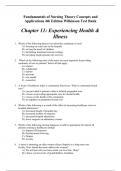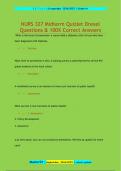Exam (elaborations)
Fundamentals of Nursing Theory Concepts and Applications 4th Edition Wilkinson Test Bank |Chapters 11-15|
- Course
- Institution
Chapter 11: Experiencing Health & Illness Chapter 12 Stress & Adaptation Chapter 13: Psychosocial Health & Illness Chapter 14: The Family Chapter 15: Culture & Ethnicity
[Show more]




